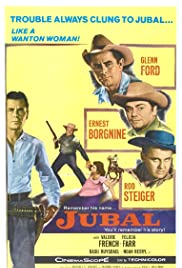
JUBAL
US, 1955, 100 minutes, Colour.
Glenn Ford, Ernest Borgnine, Rod Steiger, Valerie French, Felicia Farr, Basil Ruysdael, Noah Beery Jr, Charles Bronson, Jack Elam.
Directed by Delmer Daves.
Jubal is a classic western from Delmer Daves who made such fine films as Broken Arrow and 3.10 To Yuma, also with Glenn Ford. Glenn Ford was at home during the 1950s in many a western including The Sheepman as well as 3.10 To Yuma. Ernest Borgnine is the older man, the ranch owner, Rod Steiger being the suspicious and vengeful farmhand. Valerie French is Borgnine’s wife, Jubal becomes involved with a travelling woman played by Felicia Farr.
What makes the film particularly interesting is that it is based on Othello with Ernest Borgnine’s character as the Othello and Rod Steiger, suitably enough, as the Iago (echoes of his Judd in Oklahoma).
1. A quality western? A psychological drama with sexual implications set in the West? How well were these ingredients combined? The importance of the Othello overtones in the character of Shep, the overtones of Iago in the character of Pinky? The Shakespearian themes as illustrated by western situations?
2. How well did the film use conventional western styles? The importance of the Cinemascope and colour, the presentation visually of the range, the cattle on the range, the religious groups migrating in the west, the various jobs that had to be done in maintaining a ranch? The importance of the musical score?
3. How interesting was the structure of the film, the stranger entering, his changing the way of life for most of the characters involved? The change in his way of life, the build-up to a climax and the final vindication? How well did this involve the audience?
4. The credibility of the plot and the characters? The presentation of their characters, the psychology of their interactions? How important for involvement and understanding of themes?
5. The centrality of the character of Jubal Troop? The impact of his arrival, the hostility of Pinky and the sneers at his being a sheepman with his smell, the contrast with the friendliness of Shep? The sign of contradiction that Jubal was going to be? A man of suffering who survived? Mae and her reactions to the arrival of Jubal, her continually thrusting herself at him, his wariness and his prudence, and the irony that this did not help him? The importance of Jubal's work on the ranch, Shep's approval of him and his response to this? The effect of friendliness on Jubal? The importance of his encounter with the migrating group, his intervening to help the group against Pinky's violence? The friendly relationship with Reb and its effect on Jubal? His fascination with Momi, the fact that he could love her, the importance of his telling his whole life story to her, the audience sharing her sympathy, her understanding of his bitterness, especially in the story of his mother's not wanting him, his father's death? How did that throw light on the character of Jubal and his reactions to the various people at the ranch?
6. How was Shep an Othello figure, a jovial and burly man, running his ranch, not trusting Pinky, bringing the best out of Jubal? The tensions and the ways these were presented in the marriage? Mae and her wandering eye, her own story about her marriage and her subsequent dissatisfaction? Shep's not suspecting Pinky of anything? The man who is finally goaded into jealousy by insinuation? The pathos of the fact that he was shot down by Jubal? The effect of this on Jubal?
7. The contrast with Pinky as a Iago figure? His sneers and self-hatred? His ambitions for the ranch, for Mae? His continued hostility towards Jubal and the contrast in their characters? The other ranchmen and their reaction to Pinky? Shep's reliance on him but not making him the foreman? The importance of the sequences between Pinky and Mae? The goading on of Shep, his manipulating the psychological reactions, his jealousy of Mae and of Jubal? The final confrontation with Jubal while loading the poses? His beating Mae? His over-reaching himself and his plans going awry? The inevitability of his death? Was he a credible evil villain?
8. The contrast of the two women? Mae and her background, the forced marriage, her inability to love Shep, Shep's cooking Jubal's advice on how to make her happy? Her affair with Pinky and its temporary nature? Her infatuation with Jubal, her following him, goading him, trying to seduce him? The importance of the sequence where she arrived at the camp for Jubal to accompany her home, the build-up to Shep's arrival and hearing her speaking in her sleep? Her lies about Jubal? The beating by Pinky and her death? Naomi by contrast as the pure girl? Her support of Jubal and helping the group to hide him? Her love for him? The contract with her jealous fiance? The inevitable happy ending and its appropriateness?
9. The contribution of the minor characters in theme and psychological strength of the film, Rob and his support of Jubal, especially at the gunfight? The migrating group and their gratitude towards Jubal, their hiding him, the devices that they took in order to avoid Pinky detecting Jubal?
10. The highlights of the film in the western styles the work, the men and their relationships in work and in recreation, the shootout at the end?
11. How well portrayed were themes of human nature, love, power and jealousy?
12. Violence and hatred? How useful Is a western setting for understanding human nature?